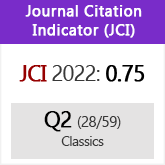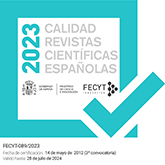Empédocles B30: ἐθρέφθη o ἐρέφθη? παρ᾽ἐλήλαται o παρελήλαται?
DOI:
https://doi.org/10.3989/emerita.2023.03.2312Palabras clave:
Empédocles B30 y B17.5;, critica textual sobre los presocráticos;, Simplicio;, lectio difficilior.Resumen
B30 introduce la ruptura del Esfero por Odio. En el v. 1 la variante ἐθρέφθη, transmitida por Arist., Metaph., está ampliamente aceptada, aunque el resto del fragmento (excepto la corrección de παρελήλαται por παρ᾽ελήλαται) procede de Simpl., in Ph. El autor propone un buen número de argumentos en favor de la lectura ἐρέφθη, preservada por el comentarista: Aristóteles citaba el fragmento de memoria, mientras que Simplicio muy probablemente tenía a su disposición el texto completo del Poema físico; no está demostrado que el verbo τρέφω pertenezca realmente al vocabulario empedocleo, porque θρεφθεῖσα en B17.5 es simplemente el producto de una enmienda de F. Panzerbieter; y hay que confiar en la lectio difficilior ἐρέφθη (‘se puso a cubierto’). Esta elección contribuye notablemente a entender cómo se inicia la disgregación del Esfero. El autor debate también el texto del v. 3, restablece la lectio tradita παρελήλαται y propone una interpretación parcialmente nueva del verso.
Descargas
Citas
Baltussen, H. (2002): «Philology or Philosophy? Simplicius on the Use of Quotations », in Worthington, I. & Foley, J. M. (eds.), Epea and grammata. Oral and Written Communication in Ancient Greece, Leiden-Boston-Cologne, pp. 173-189. https://doi.org/10.1163/9789004350922_016
Benveniste, É. (1969): Le vocabulaire des institutions indo-européennes, Paris, I-II. Bollack, J. (1965-1969): Empédocle I-III, Paris.
Burkert, W. (1972): review of Bollack, J., Empédocle, II-III, Paris 1969, in Gnomon 44, pp. 433-442.
Chantraine, P. (1963): Grammaire homérique. II: Syntaxe, Paris.
Chantraine, P. (1968-1980): Dictionnaire étymologique de la langue grecque. Histoire des mots, I-IV, Paris.
Demont, P. (1978): «Remarques sur le sens de τρέφω», Revue des études grecques 91, pp. 358-384. https://doi.org/10.3406/reg.1978.4200
Diels, H. (1895): Simpliciii in Aristotelis Physicorum Libros Quattuor Posteriores Commentaria, Berlin. https://doi.org/10.1515/9783112516669
Diels, H. (1901): Poetarum Philosophorum Fragmenta, Berlin.
Diels, H. (ed.) (1903): Die Fragmente der Vorsokratiker, Berlin.
Diels, H. (ed.) (1906): Die Fragmente der Vorsokratiker, I, 2nd ed., Berlin. D.-K. = Diels, H. & Kranz, W. (1951-1952): Die Fragmente der Vorsokratiker, I-III, 6th ed., Zürich-Hildesheim.
Fazzo, S. (2017): «Lo stemma codicum della Metafisica di Aristotele», Revue d'histoire des textes 12, pp. 35-58. https://doi.org/10.1484/J.RHT.5.112807
Ferella, C. (2019): «Ζεὺς μοῦνος and Parmenides' What-is», in Santamaría, M. A. (ed.), The Derveni Papyrus. Unearthing Ancient Mysteries, Leiden, pp. 65-74. https://doi.org/10.1163/9789004384859_007
Frisk, H. (1960): Griechisches Etymologisches Wörterbuch, I-II, Heidelberg.
Gallavotti, C. (ed.) (1975): Empedocle, Poema fisico e lustrale, [Milan].
Gemelli Marciano, M. L. (1990): Le metamorfosi della tradizione. Mutamenti di significato e neologismi nel Peri Physeos di Empedocle, Bari.
Gemelli Marciano, M. L. (ed.) (2013): Die Vorsokratiker II. Parmenides, Zenon, Empedokles, 3rd ed., Berlin. https://doi.org/10.1524/9783050094571
Hayduck, M. (ed.) (1888): Asclepii in Aristotelis Metaphysicorum libros A-Z Commentaria, Berlin.
Hölscher, U. (1968): Anfängliches Fragen. Studien zur frühen griechischen Philosophie, Göttingen.
Inwood, B. (2001): The Poem of Empedocles, A Text and Translation with an Introduction by B. Inwood, Revised Edition, 2nd ed., Toronto-Buffalo-London.
Jaeger, W. (ed.) (1957): Aristotelis Metaphysica recognovit brevique adnotatione critica instruxit W. Jaeger, Oxford.
Karsten, S. (1838): Empedoclis Agrigentini carminum reliquiae. De vita ejus et studiis disseruit, fragmenta explicuit, philosophiam illustravit S. Karsten, Amsterdam.
Kirk, G. S., Raven, J. E. & Schofield, M. (1983): The Presocratic Philosophers. A Critical History with a Selection of Texts, 2nd ed., Cambridge. https://doi.org/10.1017/CBO9780511813375
Kroll, G. (ed.) (1902): Syriani in Metaphysica Commentaria, Berlin. https://doi.org/10.1515/9783112360828
L.-M. = Laks, A. & Most, G. W. (ed.) (2016): Early Greek Philosophy. V. Western Greek Thinkers, Part 2, Cambridge, MA-London.
Louis, P. (ed.) (1982): Aristote, Météorologiques, I-II, Paris.
Martin, A. & Primavesi, O. (1999): L'Empédocle de Strasbourg (P. Strasb. gr. Inv.1665-1666). Introduction, édition et commentaire, Berlin-New York.
Meriani, A. (1990): «Ἀναίσιμος: da Plutarco ad Empedocle (Emp. fr. 27a D.-K. = Plut. mor., 777c)», in Gallo, I. (ed.), Contributi di filologia greca, Napoli, pp. 121-125.
Messina, G. (1991): «Il lessico di Empedocle», in Imbraguglia, G., Badolati, G. S., Morchio, R., Battegazzore, A. M. and Messina, G. (eds.), Index Empedocleus, I, Genova, pp. 81-212.
Moraux, P. (1967): «Parisinus Graecus 1853 (ms. E) d'Aristote», Scriptorium 21, pp. 17-41. https://doi.org/10.3406/scrip.1967.3283
Mullach, F. G. A. (1860): Fragmenta Philosophorum Graecorum collegit, recensuit, uertit, annotationibus et prolegomenis illustrauit, indicibus instruxit Fr. Guil. Aug. Mullachius. Poeseos philosophicae caeterorumque ante Socratem philosophorum quae supersunt, Paris.
O'Brien, D. (1969): Empedocles' Cosmic Cycle. A Reconstruction from the Fragments and Secondary Sources, Cambridge.
O'Brien, D. (1981): Pour interpréter Empédocle, Paris-Leiden. https://doi.org/10.1163/9789004320598
O'Brien, D. (2010): «Μονίη in Empedocles: Sling's 'Iron Rule'», Mnemosyne 63, pp. 268-271. https://doi.org/10.1163/156852510X456606
Pasquali, G. (1952): Storia della tradizione e critica del testo, 2nd ed., Florence.
Picot, J.-C.: https://sites.google.com/site/empedoclesacragas/home.
Primavesi, O. (ed.) (2021a): Die Vorsokratiker. Griechisch/Deutsch, von J. Mansfeld und O. Primavesi, Stuttgart.
Primavesi, O. (2021b): «Pythagorean Ratios in Empedocles' Physics», in Harry, Ch. C. & Habash, J. (eds.), Brill's Companion to the Reception of Presocratic Natural Philosophy in Later Classical Thought, Leiden, pp. 113-192. https://doi.org/10.1163/9789004443358_007
Rashed, M. (2018): La jeune fille et la sphère. Études sur Empédocle, Paris.
Reboredo, L. (2021): «Três fragmentos de Empédocles (B 30, B 110, B 115): texto grego e tradução», Anais de filosofia clássica 29, pp. 169-173.
Reynolds, L. D. & Wilson, N. G. (1991), Scribes and Scholars. A Guide to the Transmission of Greek and Latin Literature, 3rd ed., Oxford. https://doi.org/10.1093/oso/9780198721451.001.0001
Ross, W. D. (1924): Aristotle's Metaphysics. A Revised Text with Introduction and Commentary, I, Oxford. https://doi.org/10.1093/oseo/instance.00263632
Saetta Cottone, R. (2023): Soleil et connaissance. Empédocle avant Platon, Paris.
Santaniello, C. (2004): «Empedocle: uno o due cosmi, una o due zoogonie?», in Rossetti, L. & Santaniello, C. (eds.), Studi sul pensiero e sulla lingua di Empedocle, Bari, pp. 23-81.
Santaniello, C. (2010): «Due frammenti e l'analogia in Empedocle: B115 D.-K. e il fr. 110 Bollack», Göttinger Forum für Altertumswissenschaft 13, pp. 17-50.
Santaniello, C. (2022): «Putting Fragments in Their Places: The Lost Works by Empedocles», Elenchos 43, pp. 197-228. https://doi.org/10.1515/elen-2022-0013
Solmsen, Fr. (1965): «Love and Strife in Empedocles' Cosmology», Phronesis 10, pp. 109-148, https://doi.org/10.1163/156852865X00103
Stein, H. (1852): Empedocles Agrigentinus. Fragmenta disposuit, recensuit, adnotauit H. Stein, Bonn.
Stephanus, H. (1573): Ποίησις φιλόσοφος. Poesis philosophica, uel saltem, Reliquiae poesis philosophicae... [Genève].
Sturz, F. G. (1805): Empedocles Agrigentinus, de uita et philosophia eius exposuit, carminum reliquias ex antiquis scriptoribus collegit, recensuit F. G. Sturz, Leipzig. https://doi.org/10.1515/9783112680766
Stüve, G. (1900): Olympiodori in Aristotelis Meteora Commentaria, ed. G. Stüve, Berlin. https://doi.org/10.1515/9783111621319
TLG: Thesaurus Linguae Graecae. A Digital Library of Greek Literature, https://stephanus.tlg.uci.edu/ stephanus.tlg.uci.edu.
Tarán, L. (2001): «The Text of Simplicius' Commentary on Aristotle's Physics», in Collected Papers (1962-1999), Leiden-Boston-Cologne, pp. 625-645. https://doi.org/10.1163/9789004453289_036
Van der Ben, N. (1975): The Proem of Empedocles' Peri Physios. Towards a New Edition of All the Fragments. Thirty-One Fragments edited by N. Van der Ben, Amsterdam.
Van der Ben, N. (1984): «Empedocles' Cycle and Fragment 17,3-5 DK», Hermes 112, pp. 281-296.
Vítek, T. (2006): Empedoklés II. Zlomky, Prague.
Von Arnim, H. (1902): «Die Weltperioden bei Empedokles», in Festschrift Theodor Gomperz dargebracht zum 70. Geburtstage am 29. März 1902 von Schülern, Freunden, Collegen, Vienna, pp. 16-27.
Wright, M. R. (ed.) (1981): Empedocles: The Extant Fragments, edited with an introduction, commentary, and concordance by M. R. Wright, New Haven-London.
Zafiropulo, J. (1953): Empédocle d'Agrigente, Paris.
Descargas
Publicado
Cómo citar
Número
Sección
Licencia
Derechos de autor 2024 Consejo Superior de Investigaciones Científicas (CSIC)

Esta obra está bajo una licencia internacional Creative Commons Atribución 4.0.
© CSIC. Los originales publicados en las ediciones impresa y electrónica de esta Revista son propiedad del Consejo Superior de Investigaciones Científicas, siendo necesario citar la procedencia en cualquier reproducción parcial o total.Salvo indicación contraria, todos los contenidos de la edición electrónica se distribuyen bajo una licencia de uso y distribución “Creative Commons Reconocimiento 4.0 Internacional ” (CC BY 4.0). Puede consultar desde aquí la versión informativa y el texto legal de la licencia. Esta circunstancia ha de hacerse constar expresamente de esta forma cuando sea necesario.
No se autoriza el depósito en repositorios, páginas web personales o similares de cualquier otra versión distinta a la publicada por el editor.














